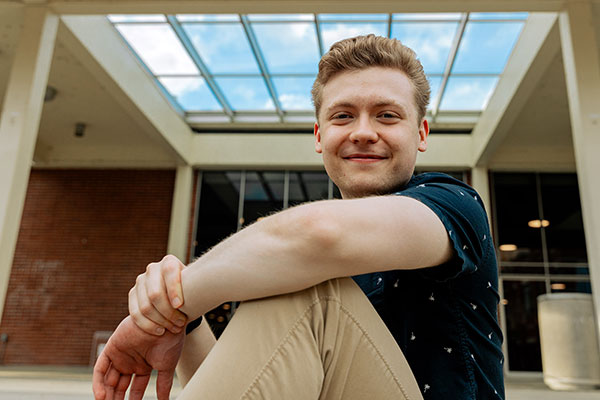From Forest Grove To Researching The Mysteries Of The Universe
 When Logan Switzer ’25 started his college career, the journey was a short drive from his Forest Grove home to the campus of Pacific University.
When Logan Switzer ’25 started his college career, the journey was a short drive from his Forest Grove home to the campus of Pacific University.
This summer, Switzer’s educational journey takes him from the laboratories of the Strain Science Center to the laboratories of one of the most prestigious scientific campuses in the world.
Switzer is one of 15 students from the United States selected this year to participate in the Research for Undergraduates Program at CERN, the European Organization for Nuclear Research. Administered through the University of Michigan, the nine-week internship program runs June through August on CERN’s campus near Geneva, Switzerland.
“This is an absolute dream,” said Switzer, who is a double major in math and physics. “This is an absolute dream for people in grad school or doing post-doctorate work or anyone just having a career in physics in general. And here I am as an undergraduate, a junior in college who already gets to have this phenomenal experience.”
As part of the program, Switzer will be paired with scientists conducting CERN’s high-level physics research, including work with the organization’s particle colliders, which are the largest and most powerful in the world.
The study of particle physics became a fascination of Switzer’s after he received an award last summer from the NASA Oregon Space Grant Consortium to do a literature review on the dark matter problem in cosmology.
Between that experience and doing summer research work in cosmology with Associate Professor of Physics Todd Duncan, Switzer was sucked into dark matter research like a black hole.
“When I did that literature review, I found that particle physics was really cool, especially connecting physics to the grand scale of the universe,” Switzer said. “Like the idea of putting your hand up against a table and realizing that the pressure you’re feeling is due to the electromagnetic repulsion of the atoms in the table.
“Connecting those small-scale things to a larger-scale thing is cool. But when you connect it to something as mysterious as the universe, it’s really cool.”
When the opportunity to apply for the CERN internship became available, Duncan was quick to encourage Switzer to apply. “While working on that project (the literature review), he learned about CERN as an ideal place to continue pursuing his question about dark matter,” Duncan said. “He poured a lot of energy into his application and had the benefit of being at a place where he received personalized mentoring to help refine his application.”
For undergraduates like Switzer, the CERN internship program holds the potential to open doors to other high-level research and graduate school opportunities. According to the University of Michigan, 13 of the program’s 90 participants between 2014 and 2019 were named Goldwater Scholars. Twenty-four received National Science Foundation Graduate Research Fellowship Program awards and one each was named a Rhodes Scholar and a Marshall Scholar.
Switzer knows that his experience at CERN will give him an advantage as he looks to graduate school after he receives his degree from Pacific in 2025. “Many institutions are connected with CERN in some way,” he said. “I’m going to be able to make so many connections with different kinds of people. I’m going to have so much laboratory experience and research experience that not many undergraduates will have.”
Following graduation, Switzer plans to move straight into graduate school. And while his experience close to home could not have been better, Switzer hopes to expand his worldview by entering a program either on the East Coast or Europe.
He hopes to continue research in high-energy particle cosmology research, working in a laboratory environment to try to solve the mysteries of the universe.
And, yes, he sees a day when he might be lucky enough to return to CERN as a researcher.
“I read a testimonial from another intern who described the lunch environment,” Switzer said. “Everybody was in the cafeteria, sitting together and talking about the things they think about, their experiments and literally anything else that they experience. That environment just sounds so perfect to work in.”


